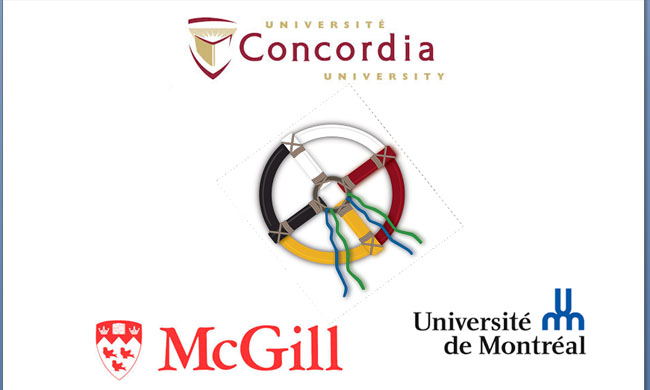Indigenous Studies explode in Montreal: More than a decade in coming
MONTREAL – More than a decade ago faculty at Concordia University began the process to create a First Peoples Studies program. Around the same time students at McGill University began a push for the creation of an Indigenous Studies program. Almost decade ago, faculty at Université de Montréal (UdeM) began discussing a program. Finally, the Université de Quebec au Montreal (UQAM) is in the process of creating a minor. While these institutions are “behind” in the development of Indigenous studies programming compared to Ontario, the West, and British Columbia, they are making a decided effort to create cultural, intellectual, and sustainable programs.
Concordia has a minor and major in First Peoples Studies, since 2013, with minors in Law and History as well as a certificate program in development. McGill’s minor in Indigenous studies launched in September 2014 while UdeM’s minor begins in 2015. All the programs seek another to offer students, Indigenous and non-Indigenous, a window into the unique knowledges of First Nations, Inuit, and Metis peoples.
In terms of faculty, Concordia currently employs two professors in First Peoples Studies, Dr. Louellyn White (Mohawk, Akwasane) and Dr. Karl Hele (Anishinaabe, Garden River) as well as four other Indigenous professors in other faculties and several Indigenous part-time instructors. McGill University employs several part-time faculty across the institution but appears to retain no full-time (tenured or tenure-stream) individuals. UdeM has a single full-time Indigenous faculty member. All three institutions hope that through the creation of these programs the woeful under-representation of Indigenous people among their professors will be rectified.
All the programs came into existence because of demand from students and a growing recognition among faculty of the importance of Indigenous peoples and their knowledges. The lengthy delay from initial interest and demands to implementation reflect more the meanders of bureaucracy than opposition or disinterest from university administration. For instance, it took approximately seven years for the Government of Quebec to authorize and accredit Concordia’s major after its approval by the university senate in 2006.
With programs being so new it is currently impossible to access their impact outside of these institutions. For instance, Concordia only graduated its first two majors at Spring Convocation in 2014. UdeM’s program can only speculate on its potential enrollment. McGill, since registration opened, has had a dozen students opt for the minor. Concordia has 38 majors and minors registered in the First Peoples program.
According to McGill alumni, Jessica Labranche (non-status Anishinaabe whose ancestors hail from Michipicoten), the university offers an affordable degree that now includes the option of taking Indigenous Studies.
Simply for her “Education is a means of consciousness and appreciation, Indigenous Studies is very critical to Canada’s collective reconciliation.”
Other alumni and current McGill students who are close to graduating and thus unable to complete the new minor, are proud of the program’s creation but express heartfelt regret that it did not exist three or more years earlier. Concordia alum and recent graduate from the First Peoples Studies program, Emma Kreuger (who is non-Aboriginal), believes that First Peoples knowledges and insights are important for all Canadians. Similarly, current McGill student Brandi Bird (Saulteaux), who came to McGill because of its name, is excited about the prospects of the new Indigenous Studies program.
All three program directors, of which only Concordia’s director is Indigenous, speak highly of the potential of their respective programs. For instance, William Straw (McGill) sees the program as building an Indigenous presence on campus. Marie-Pierre Bousquet (UdeM) sees the potential to “favorise [Indigenous] knowledge about Native realities and their impacts.”
While Karl Hele (Concordia) believes that the process of indigenization of the academy as well as the education of Indigenous and non-Indigenous about the First Peoples in Quebec and Canada is key to fulfilling the promise of reconciliation. All three institutions are establishing linkages in an effort to avoid program duplication and competition, thereby keeping the education of Indigenous students at the forefront of their visions.
With programs soon to be available in English and French, Indigenous Studies in Montreal will have a great impact on Quebec and Canada.


